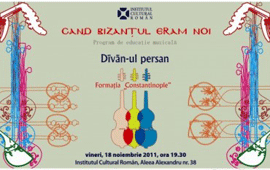> [Archived] Chronicles

The Persian Divan at the Romanian Cultural Institute
The recital was an incursion into the musical world of the Persian Empire of the XVI century. In the first half of the show we listened to a long improvisation by Kiya Tabassian who played voce and sétar, together with his son, percussionist Ziya Tabassian. In the second half of the show the other members of the Constantinople ensemble joined in: Didem Basar (kanun), Pierre-Yves Martel (viola da gamba) and oud player Kiriakos Kalaitzides. The ensemble is a special one, made up of Iranian, Turkish, Greek and Canadian musicians. What was interesting was the use of the viola da gamba, an instrument specific to the Baroque Western Europe, which was adapted to perform oriental music. The works presented during the second half were Persian, gathered together by Dimitrie Cantemir in 'The Book of the Science of Music'.
The host of the evening, as usual, was Constantin Raileanu, the leader of the Music Ensemble Anton Pann, who also said to us a few words about the event.
'It was a concert as we had expected it to be. It seems to me a normality which should happen on every stage in Romania. This type of concert should be a daily presence, because I have lobbied - I have always claimed in the front of many institutions and important persons that in reality we are as much oriental as we are occidental. It is only natural that we should get to know our oriental past, because in the XXI century we should learn from both sides what is good for us, because Orient and Occident alike have their good sides and the not so good sides. Tonight's concert, at least this year, was one to confirm that the Romanian audience is an educated one, it is an audience who knows to appreciate good music and it met my expectations, in the sense that musicians, who come from all corners of the world with which Romania has never interacted, have seen that the audience here is a refined one, who can appreciate a quality musician.'
After the recital we talked to Kiya Tabassian, the leader of the Constantinople ensemble, a musician who was trained in the oriental style as well as in the occidental one, and who talked about the connections that music can create.
'It is a joy for us to be here in Cantemir's birth country, a personality that has had a profound impact on oriental culture. Even if he lived 300 years ago, we can still penetrate the atmosphere of his country during his time, through the monuments and cultural legacy.
I believe there have always been connections between east and west. Man, in his essence, has always needed to communicate. From history we know more about the conflicts than about the positive things, that is why we, as a musical group, try to put an accent on those positive exchanges that we know have taken place between musicians and artists in general. Music is a universal language, and we are trying to discover the common roots of the different artistic traditions. Everything is like a maze, in which all cultural elements are interconnected.'
Translated by Florina Sãmulescu
MTTLC, Bucharest University














